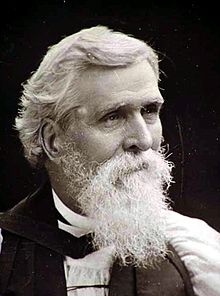Robert Caldwell
| Robert Caldwell | |
|---|---|
 |
|
| Born |
Robert Caldwell 7 May 1814 Clady, Belfast, Northern Ireland |
| Died | 28 August 1891 Kodaikanal, Palani Hills, Tamil Nadu |
| Nationality | British |
| Occupation | Missionary, Linguist |
| Known for | Bishop in South India |
Bishop Robert Caldwell (7 May 1814 – 28 August 1891) was a missionary and linguist, who academically established the Dravidian family of languages. He served as Assistant Bishop of Tirunelveli from 1877. He was described in The Hindu as a 'pioneering champion of the downtrodden' and an 'avant-garde social reformer'. The Government of Tamil Nadu has created a memorial in his honor and a postage stamp has been issued in his name. On the Madras Marina, a statue of Caldwell was erected as a gift of the Church of South India in 1967.
Robert Caldwell was born at Clady, then in County Antrim, Ireland, on 7 May 1814 to poor Scottish Presbyterian parents. The family moved to Glasgow and there he began work at the age of nine. Mostly self-taught, he returned to Ireland aged 15, living with an older brother in Dublin while studying art between 1829 and 1833. He then returned to Glasgow, probably as a consequence of a crisis of faith, and he became active in the Congregational church.
Caldwell won a scholarship to Balliol College, Oxford only to find it rescinded when the authorities discovered that he had been born in Ireland. He responded by joining the London Missionary Society, who sent him to the University of Glasgow for training. There Caldwell came under the influence of Daniel Keyte Sandford, a professor of Greek and promoter of Anglicanism whose innovative research encouraged Caldwell's liking for comparative philology and also theology. Caldwell left university with a distinction and was ordained as a Congregationalist minister.
...
Wikipedia
